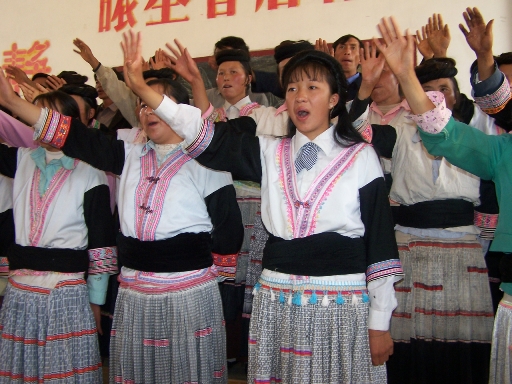The Future of the Church in China: Why China’s House Churches will Prevail
3. Worship Patterns
The TSPM
The rural church was packed with people. They listened attentively as the minister, a Chinese pastor from Hong Kong with charismatic leanings, spoke passionately about the work of the Holy Spirit. A TSPM pastor and friend had brought us to this place to meet with local believers and speak to them. As the minister from Hong Kong came to the end of his sermon, he challenged the congregation to seek the infilling of the Holy Spirit.

It is not easy for TSPM leaders to maintain their integrity as Christians and at the same time stay out of trouble. The temptation to avoid taking risks or to allow others to do so must be very strong.
I glanced at my TSPM friend, who was still standing in his place among the pews, and wondered how he would respond. I knew that what was happening was unique for most TSPM churches, which tend to shy away from any hint of emotion in their services. As the volume of prayer grew and the prayer time reached its climax, our TSPM friend strode to the front of the church and in a loud voice began to pray a concluding prayer. The message was clear: he was not comfortable with what was happening and felt that he needed to stop the meeting. The believers quickly dispersed back to their seats and the service came to an end.
Again, this story illustrates a striking difference between the TSPM and the house churches. The TSPM church lives with very real restrictions. The manner in which these restrictions are followed and enforced varies widely, depending on the local government and church leadership. But the restrictions are there nonetheless and they do impact the life of the church.
We have already noted that the government does influence the selection of leaders and it does restrict the settings in which the church can meet. But the government also influences the theology and practice of the church in a more subtle way. If compliance with government regulations is a key concern for church leaders, then will they not naturally be more controlling in their handling of church life? Will they not inevitably be less open to allowing Spirit-led people to engage in ministry for fear that they might break the rules?
Churches in the West are reluctant to give opportunity to untutored lay people to speak or exercise public ministry. But what if there is even more is at stake than suffering through an embarrassing moment or facing a disgruntled parishioner?
This sort of posture, of course, puts them squarely at odds with believers who feel led by the Spirit to minister beyond the confines of the limitations imposed upon them. I have watched TSPM leaders struggle with how to deal with earnest, eager believers who feel led to engage in ministry or evangelism in ways considered illegal in China. It is not easy for these leaders to maintain their integrity as Christians and at the same time stay out of trouble. In this context, the temptation to avoid taking risks or to allow others to do so must be very strong.
There are undoubtedly a variety of reasons for the largely controlling stance of TSPM churches, but one cannot avoid feeling that this characteristic of TSPM church life is exaggerated by the need to comply with government regulations. The government wants safe, reliable people controlling the church and its meetings, people that it can depend on not to cause problems or transgress the party line. In the TSPM, too much fire and fervency is problematic.
This assessment is supported by the conclusions and tone of perhaps the most significant work published on the Holy Spirit within TSPM circles, The Work of the Holy Spirit (Sheng Ling de Gong Zuo) by Jing Jiu Wei (TSPM of Hebei, 2002). Pastor Jing concludes with this warning:
“…the Chinese church blindly advances the cause of the charismatic movement. I still believe this is not appropriate, for if we compare the quality of the faith of Chinese believers with that of the overseas church, there is still a relatively big difference. There are still not enough [in China] who have grasped the truths of Scripture, and in this way, they seek the Holy Spirit without being watchful. My great fear is that they may go astray” (my translation of Jing, Sheng Ling de Gongzuo, 375).
One result of this conservative and controlling approach is a largely rational (non-emotional) approach to worship. I find this very uncharacteristic of Chinese people in general. The experience of the indigenous church movements prior to 1949 and the experience of contemporary Chinese churches in the large cities of Malaysia, Indonesia, Hong Kong, and Taiwan point in a different direction.[8]
Category: Ministry, Winter 2017


